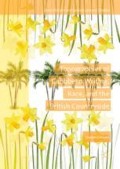Abstract
This chapter emphasizes Jean Rhys’s novels Voyage in the Dark and Wide Sargasso Sea, both of which offer perspectives on how young women of Caribbean origin perceive and then view England on their arrival. It also examines some of Rhys’s short stories, and accounts of the countryside therein, some non-fiction accounts found in her autobiography and her published letters and unpublished papers. Rhys’s childhood and upbringing in Dominica persist in her work and shape her views of England and Wales. Rhys deploys topographical observation and description to explore her own and her characters’ emotional and psychological ambivalence to Britain. Rhys’s textual engagement with the countryside of Britain shows that this is mediated through a Caribbean lens and that representations of British countryside are a key tool in Rhys’s negotiated responses to a country where she found herself marginalized, both as a woman and as a “horrid colonial” (CSS 153).
Access this chapter
Tax calculation will be finalised at checkout
Purchases are for personal use only
Notes
- 1.
Elaine Savory points to the complex nature of critical readings of Rhys’s work: “Jean Rhys and her texts have been interpreted by different critics and theorists in strikingly different ways. She and they are in those readings: Caribbean, English, European; feminist and anti-feminist; elite, working class , marginal; white and white Creole ; outsider and insider; ageless and of her time. But one identity can hold all of these contradictory facets: Rhys is a Caribbean writer” (x).
- 2.
Rhys has used different names and different spellings (Gwendoline and Gwendolen). It is also difficult to say exactly when or why Rhys adopted the name “Jean Rhys”. The acting school she attended in London in 1909 documents her name as Ella Williams; Rhys refers to herself as “Gwen” in her undated and unpublished “Essay on England” but she is most commonly known as Jean Rhys. No clearer is the reason why she adopted the name. Rhys comes from Rees (her father was William Rees Williams), but the spelling change is unexplained, and it is unclear from where or why she adopted “Jean”.
- 3.
Posthumous publications include her (unfinished) autobiography Smile Please (1981), Letters (1984), and The Collected Short Stories (1987).
- 4.
Diana Athill sees three distinct groups in Rhys’s short story writing: “early work, written before Rhys’s first novel”; “stories written, or completed, in the sixties”; and finally “stories written, or completed when she was an old woman” (vii).
- 5.
- 6.
See Helen Carr’s description in Jean Rhys: “…her sense of herself as a Caribbean was always ambivalent and insecure: a white Creole (if she was entirely white, something of which she was increasingly uncertain)” (16).
- 7.
Uncited in her text, and un-documented or un-attributed elsewhere to date, the passage Rhys refers to is clearly from a Heinrich Heine essay, “Gods in Exile” (The Prose Writings of Heinrich Heine, 282). In the introduction to that text, Havelock Ellis comments that after Heine’s visit to England (around 1826) he found London “frightfully damp and uncomfortable, while Paris—where he subsequently went to live—was the ‘New Jerusalem’” (xiii). It would seem Rhys shared Heine’s sentiments towards London and Paris (which she preferred). Heine is also famous for his quotation about burning books: “Where one burns books, one will, in the end, burn people”, and this may have provided Rhys with part of the inspiration for her short story “The Day they Burned the Books”, which is examined later in this chapter.
- 8.
This passage also relates closely to an extract from “Essay on England”: “… So to me England was a wonderful place, but all I knew of it was a small brown map on a page of my geography book.… And at the end of the, as it were, essay, would come sentences –Exports, Imports…. And then, right at the end ‘Character of the Inhabitants.’ … Under England you had something like this Exports: Coal, cotton…. And so on. But somehow the words looked black”.
- 9.
For further discussion on Rhys’s honed short fiction prose style, see Johnson , J. “I Cut It and Cut It: Rhys’s Short Short Fiction.” The Caribbean Short Story: Critical Perspectives, edited by Lucy Evans et al., Peepal Tree Press, 2011, pp. 169–182.
- 10.
Unpublished drafts of this story housed at the McFarlin Library at the University of Tulsa show this change in title.
- 11.
The title echoes one of Virginia Woolf’s reflections, “On Not Knowing Greek”, from The Common Reader (1925).
- 12.
In his introduction to the first edition of Wide Sargasso Sea , Rhys’s editor Francis Wyndham suggests that for Anna in Rhys’s third novel, Voyage in the Dark , “[m]emories of her childhood on a West Indian island, of kind coloured servants and tropical beauty, form a poignant accompaniment to her adventures in an icy suspicious land” (WSS 8).
Author information
Authors and Affiliations
Rights and permissions
Copyright information
© 2019 The Author(s)
About this chapter
Cite this chapter
Johnson, J. (2019). Remembrance Rocks. In: Topographies of Caribbean Writing, Race, and the British Countryside. Geocriticism and Spatial Literary Studies. Palgrave Macmillan, Cham. https://doi.org/10.1007/978-3-030-04134-2_2
Download citation
DOI: https://doi.org/10.1007/978-3-030-04134-2_2
Published:
Publisher Name: Palgrave Macmillan, Cham
Print ISBN: 978-3-030-04133-5
Online ISBN: 978-3-030-04134-2
eBook Packages: Literature, Cultural and Media StudiesLiterature, Cultural and Media Studies (R0)

